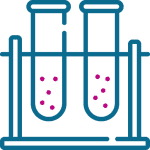Cholesterol
Cholesterol testing differs from many other tests in that it is not only used to detect disease, but also to assess the risk of disease – especially ischaemic heart disease.
4,50 €

What is the need for a study?
Cholesterol testing differs from many other tests in that it is not only used to detect disease, but also to assess the risk of disease – especially ischaemic heart disease. High cholesterol levels are associated with atherosclerosis, coronary heart disease and increased risk of heart attack, so cholesterol tests are routinely carried out as part of preventive care.
When should I be tested?
For adults, it is recommended to have a cholesterol test every five years. The test is performed more frequently (up to several times a year) in patients who have been prescribed a diet and/or cholesterol-lowering drugs to check the effectiveness of the adapted measures. Lowering cholesterol to a desirable level means a lower risk of heart disease. Cholesterol tests are also more commonly prescribed for people at higher risk of heart disease: smokers, people over 45. for men or women aged 55 or over women with hypertension (blood pressure above 140/90 mmHg or on blood pressure-lowering medication), diabetes, and known history of cardiovascular disease in relatives at an early age (up to age 55 for men and up to age 65 for women).
What sample is needed for the test?
Blood is drawn from a vein in the arm.
How to prepare for the survey?
You should abstain from eating for 9-12 hours before the sample is taken. You can only drink water.
What do my results mean?
Cholesterol results for cardiovascular disease risk can be categorised as follows:
1. Preferred outcomes (<5.2 mmol/l) – indicates a low risk of heart disease;
2. Borderline results (5.2-6.2 mmol/l) – indicates an average risk of heart disease. If other lipidogram tests (LDL ‘bad’ cholesterol and HDL ‘good’ cholesterol) have not been performed, the doctor may ask for them to be performed in order to properly assess whether treatment is needed.
3. High risk results (>6.2 mmol/l). To find out the cause of the increase, a full lipidogram (LDL ‘bad’ cholesterol and HDL ‘good’ cholesterol and triacylglycerols) and other laboratory tests are needed. Once the cause has been identified, your doctor will prescribe the right treatment.
Related studies
Glucose, high-sensitivity C-reactive protein, NT-proBNP, other lipids: LDL cholesterol, HDL cholesterol, triacylglycerols, lipoprotein(a), ApoA, ApoB, non-HDL cholesterol, atherogenicity index
Related conditions/diseases.
Cardiovascular diseases: myocardial infarction, stroke, hypertension.
You can consult our family doctors.
